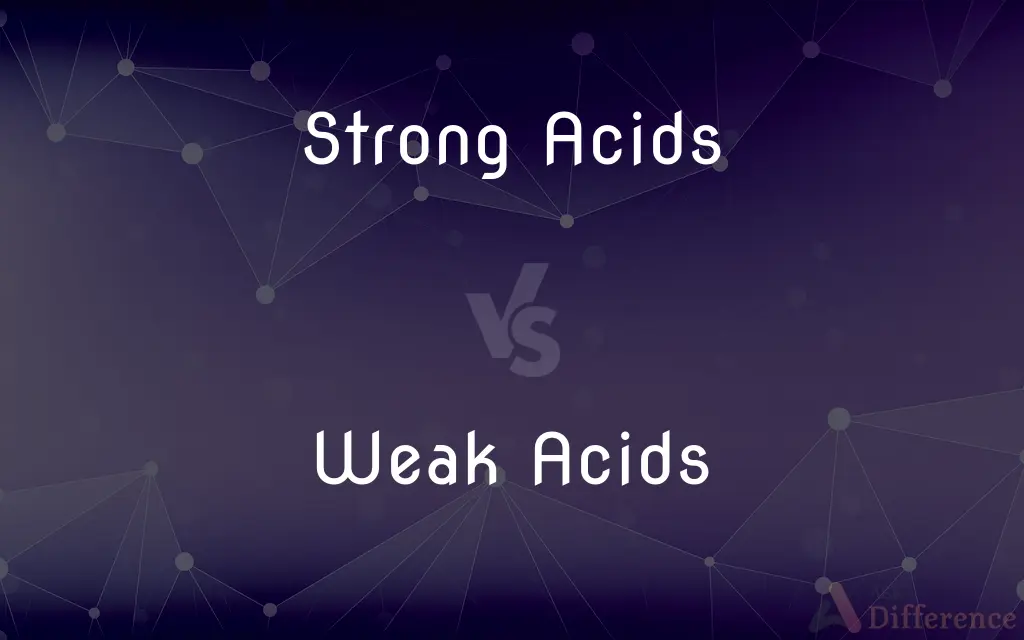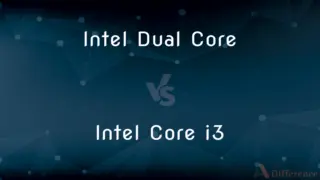Strong Acids vs. Weak Acids — What's the Difference?
Edited by Tayyaba Rehman — By Fiza Rafique — Published on December 31, 2023
Strong Acids completely dissociate in water, releasing more hydrogen ions, whereas Weak Acids partially dissociate, releasing fewer hydrogen ions.

Difference Between Strong Acids and Weak Acids
Table of Contents
ADVERTISEMENT
Key Differences
Strong Acids, by definition, undergo complete dissociation in water, meaning they release a significant amount of hydrogen ions (protons) when dissolved. This results in a higher concentration of these ions in solution. On the other hand, Weak Acids only partially dissociate in water, producing a lesser quantity of hydrogen ions compared to their strong counterparts.
Strong Acids typically have lower pH values due to their ability to release more protons into the solution. This high proton concentration leads to a more acidic environment. In contrast, Weak Acids, with their limited dissociation, yield higher pH values, indicating a less acidic solution compared to strong acids.
From a chemical standpoint, Strong Acids have a stronger tendency to donate protons to other substances. They react more vigorously and can be more hazardous. Weak Acids, while still capable of donating protons, do so to a lesser extent and generally exhibit milder reactions.
The behavior of Strong Acids and Weak Acids also varies in different chemical reactions. For instance, Strong Acids can readily neutralize bases, producing salt and water. Weak Acids, given their limited proton release, might require larger quantities to achieve similar neutralization effects.
In everyday scenarios, both Strong Acids and Weak Acids find numerous applications. While Strong Acids might be used for industrial purposes, such as cleaning and manufacturing, Weak Acids are often found in household items, including vinegar and citrus fruits.
ADVERTISEMENT
Comparison Chart
Dissociation in Water
Complete dissociation
Partial dissociation
PH Value
Lower pH (more acidic)
Higher pH (less acidic)
Proton Donation
Donates protons readily
Donates protons less readily
Reactivity
More reactive
Less reactive
Common Examples
Hydrochloric acid, Sulfuric acid
Acetic acid, Carbonic acid
Compare with Definitions
Strong Acids
Substances that release a high concentration of hydrogen ions in solution.
Sulfuric acid, a Strong Acid, drastically lowers pH due to its proton release.
Weak Acids
Mild acids commonly found in everyday substances.
Many fruits contain Weak Acids like malic acid that give them a tangy taste.
Strong Acids
Acids that undergo complete dissociation in water.
Hydrochloric acid is a Strong Acid that dissociates entirely in water.
Weak Acids
Acids with a lesser tendency to donate protons compared to their stronger counterparts.
Citric acid, a Weak Acid, has a moderate ability to donate protons.
Strong Acids
Acids that have a pronounced ability to donate protons.
Nitric acid, a Strong Acid, can donate protons readily in reactions.
Weak Acids
Substances that release a limited amount of hydrogen ions in solution.
Carbonic acid, a Weak Acid, has a higher pH than Strong Acids.
Strong Acids
Highly reactive acids used in various chemical processes.
In industrial settings, Strong Acids like phosphoric acid play pivotal roles in manufacturing.
Weak Acids
Acids that undergo only partial dissociation in water.
Acetic acid in vinegar is a Weak Acid that doesn't fully dissociate.
Strong Acids
Acids characterized by their lower pH values in aqueous solutions.
The pH of a Strong Acid like hydrobromic acid is typically much lower than that of water.
Weak Acids
Acids characterized by their relatively higher pH values in aqueous solutions.
The pH of a Weak Acid like formic acid is higher than that of Strong Acids.
Common Curiosities
Which is a common Strong Acid found in the stomach?
Hydrochloric acid is a Strong Acid present in the stomach.
What distinguishes Strong Acids from Weak Acids in terms of dissociation?
Strong Acids completely dissociate in water, while Weak Acids only partially dissociate.
Can Weak Acids neutralize bases like Strong Acids?
Yes, but Weak Acids may require larger quantities to achieve similar neutralization effects as Strong Acids.
Are Strong Acids always corrosive?
While many Strong Acids are corrosive, the degree of corrosiveness can vary based on concentration and other factors.
Are Strong Acids more hazardous than Weak Acids?
Generally, Strong Acids are more reactive and can be more hazardous than Weak Acids.
Can Weak Acids corrode metals like Strong Acids?
Some Weak Acids can corrode metals, but typically at a slower rate than Strong Acids.
How do Strong Acids affect pH compared to Weak Acids?
Strong Acids result in lower pH values, making solutions more acidic than Weak Acids.
Which is a typical Weak Acid found in sodas?
Carbonic acid is a Weak Acid commonly found in carbonated drinks.
Why don't Weak Acids release as many protons as Strong Acids?
Weak Acids only partially dissociate, so they release fewer protons in solution compared to Strong Acids.
Do Strong Acids and Weak Acids both conduct electricity in solution?
Yes, both Strong Acids and Weak Acids can conduct electricity, but Strong Acids generally conduct better due to higher ion concentration.
Are all Strong Acids dangerous to handle?
While many Strong Acids require careful handling, the risk depends on the specific acid and its concentration.
How can one determine if an acid is strong or weak in a laboratory setting?
Measuring the pH of an acid's solution can give an indication; Strong Acids have lower pH values than Weak Acids.
Is vinegar considered a Strong Acid or a Weak Acid?
Vinegar contains acetic acid, which is a Weak Acid.
Which has a more pronounced taste, Strong Acids or Weak Acids?
While both can be tangy, Strong Acids generally have a more pronounced acidic taste than Weak Acids.
Are lemon and orange juices considered Strong Acids or Weak Acids?
Both lemon and orange juices contain citric acid, which is a Weak Acid.
Share Your Discovery

Previous Comparison
Intel Dual Core vs. Intel Core i3
Next Comparison
How About vs. What AboutAuthor Spotlight
Written by
Fiza RafiqueFiza Rafique is a skilled content writer at AskDifference.com, where she meticulously refines and enhances written pieces. Drawing from her vast editorial expertise, Fiza ensures clarity, accuracy, and precision in every article. Passionate about language, she continually seeks to elevate the quality of content for readers worldwide.
Edited by
Tayyaba RehmanTayyaba Rehman is a distinguished writer, currently serving as a primary contributor to askdifference.com. As a researcher in semantics and etymology, Tayyaba's passion for the complexity of languages and their distinctions has found a perfect home on the platform. Tayyaba delves into the intricacies of language, distinguishing between commonly confused words and phrases, thereby providing clarity for readers worldwide.











































